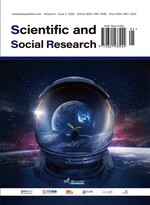Abstract
While digital platforms control user behavior through algorithms, users are also using algorithms to achieve their own goals. Based on the domestication theory, this paper explores the mechanism of algorithmic behavior when users use social platforms through in-depth interviews. This paper finds that under the influence of platform content, privacy management, platform functions, and personal emotions, users will adopt the re-domestication strategy of transfer, resistance, and reconstruction. This study extends the explanatory power of domestication theory to social platforms and also provides new thinking on the relationship between humans and technology.
References
Dai YC, 2019, “Old Acquaintances” and “New Reunions”: Actor Network Theory and the Future of Media Studies: A Theoretical History Perspective. International Journalism, 41(04): 68–88.
Hirsch E, Silverstone R, 1992, Information and Communication Technologies and the Moral Economy of the Household, in Consuming Technologies. Routledge, London, 20–26.
Berker T, Hartmann M, Punie Y, et al., 2005, Domestication of Media and Technology. Open University Press, New York, 1–17.
Wang SM, 2014, Domesticating IM: Disclosure, Negotiation and Creation in Instant Messaging. Chinese Journal of Communication, 2014(25): 161–192.
Sun LZ, 2021, The Game and Construction of “Human-Technology” Relationship in Artificial Intelligence Education: From Reverse Domestication to Technological Mediation. Open Education Research, 27(06): 37–43. https://doi.org/10.13966/j.cnki.kfjyyj.2021.37.004
Jiang XL, Zhong DB, 2022, “Serving in Things” to “Fake in Things”: A Study on the Practice of “Re-domestication” of Short Video Users in the Context of Algorithmic Anxiety. Journal of Southwest University for Nationalities (Humanities and Social Sciences Edition), 43(12): 144–152.
Bucher T, 2012, Want to Be on the Top? Algorithmic Power and the Threat of Invisibility on Facebook. New Media & Society, 14(7): 1164–1180.
